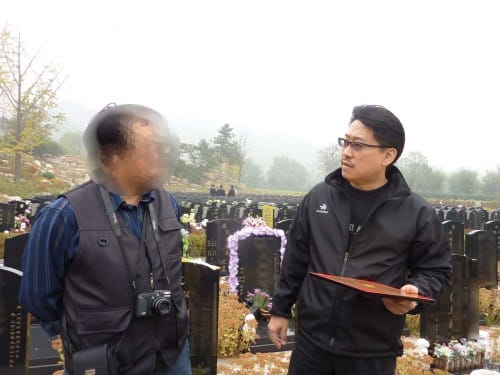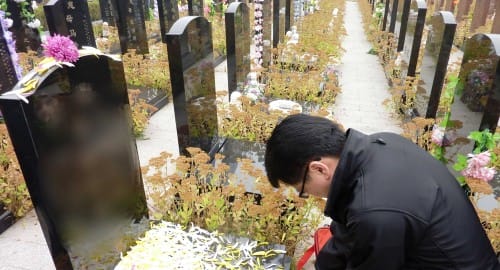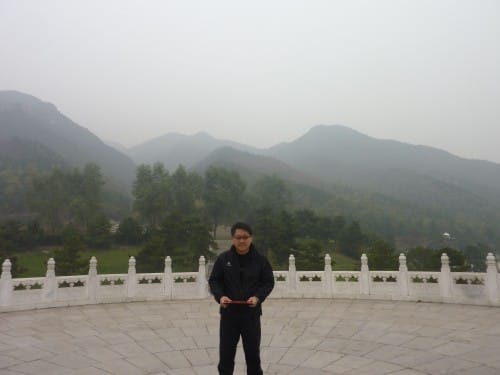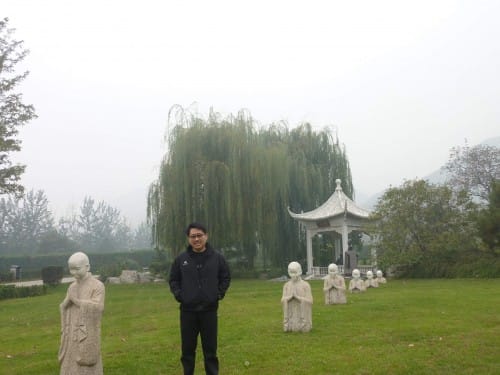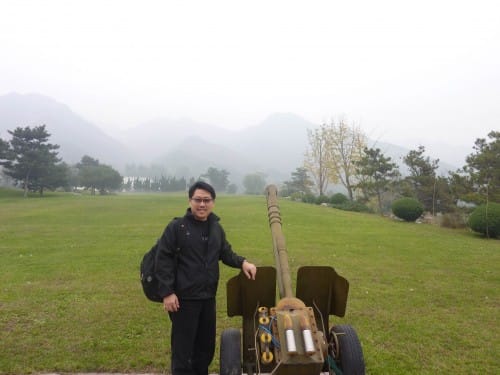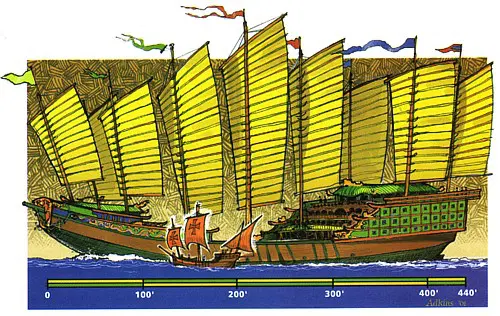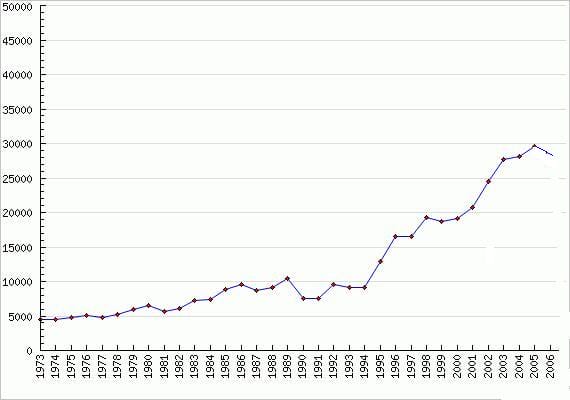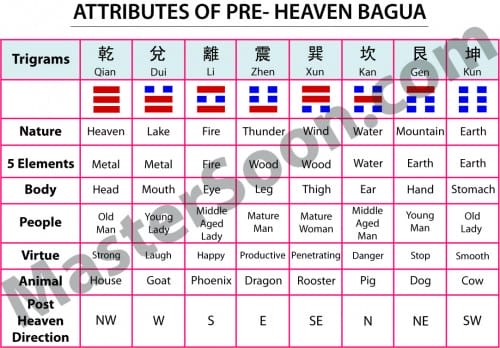
In Penang, it is said that this Chinese Temple was built based on the effort and contribution of the then Penang State Chief Minister, Koh Tzu Koon.
Tan Sri Koh Tsu Koon had been the Chief Minister of Penang State from 1990-2008. The significance of Penang State Chief Minister is that it is the only seat of Chief Minister in Malaysia always held by Chinese since independence in 1957 even until today. As a feng shui master, it has been my daily job to go to the fieldwork to collect data and proof from various perspective as long as contemporary issues are concerned.
The photo above is a Chinese temple. In an Islamic country like Malaysia, to build a non-islamic praying place is always NOT an easy task. In this case, Malaysian Chinese always rely on their Chinese origin representatives in government to lobby for this matter…. It is said that Tan Sri Koh Tzu Koon had contributed a lot by utilizing his Chief Minister position to materialize the construction of this temple…. ( to be fair, he had initiated many temples during his 18 years reign as Penang Chief Minister).
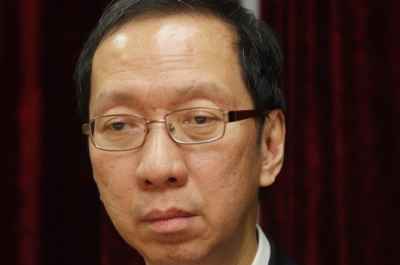
Koh Tzu Koon, (Penang State Chief Minister from 1990-2008)
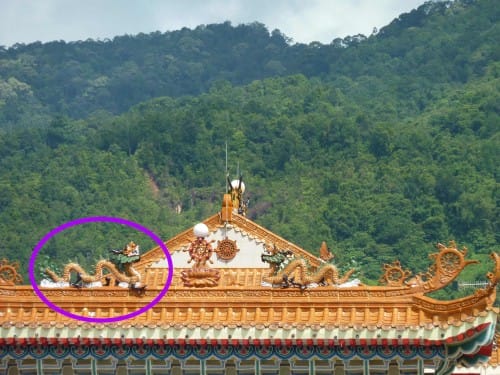
In the midnight on 08 March 2008, the night before the announcement of the FINAL result of Malaysia General Election(08 March 2008), the thunder struck and broke the left dragon(circled by purple color). On the evening of 08 March 2008, the contributor of this temple, Gerakan Party (under leadership of Koh Tzu Koon) was declared lost ALL seats contested. Lost All seats.......
In the night of 07 March 2008 was a raining night. The rain getting heavier after 12am(08 March 2008). Suddenly, thunder struck and broke the left dragon statue on the rootop of this Chinese Temple. In the evening on 08 March 2008, all Penang State seats contested by Gerakan Party (under leadership of Koh Tzu Koon) were declared unseated by opposition party. ……
Thunder struck and broke the dragon statue. In less than 12 hours, the then Chief Minister was declared to lose all seats contested under the banner of his party.

Visually, you could see the color of the two dragon statues are different. The left dragon is more shining...
This is sign of mandate….. meaningful coincidence….. In Yijing and Daoism philosophy, this sign is called as “Heaven Mandate shows his decision” 天垂象 显示吉凶
In Chinese metaphysic, there is no so called ” accident”. Everything is meaningful coincidence. Accidence; is lay people concept. Because lay people cannot understand the reality beyond reality. However, a competent metaphysician should be able to see the reality beyond the reality, be able to see what lay people cannot see or understand. When you could see the reality which lay people cannot see, then, at the moment you could see and understand all accidents are within the context of “divine planning”. Therefore, to those who could see the “divine planning”, there is no event called as ” accident”. Knowing this, you should be able to understand why I say ” accident” is a concept belong to lay people or non-metaphysician.
Master Soon
email : master@mastersoon.com
mobile: +6012 560 3333
Tan Sri Dr. Koh Tsu Koon (born August 26, 1949 in Penang; simplified Chinese: 许子根; traditional Chinese: 許子根; is a Malaysian politician. He was the Chief Minister of Penang from 1990 to 2008 and is currently a member of the Dewan Negara, the upper house of the Malaysian Parliament. In April 2009, Koh was appointed Minister in the Prime Minister’s Department by Prime Minister Najib Tun Razak. He is currently president of Parti Gerakan Rakyat Malaysia (Gerakan), a member of the ruling Barisan Nasional coalition.
In the 1990 general election, Chief Minister Lim Chong Eu lost his state seat. Koh, who was a first-term state assemblyman from Tanjung Bungah, was selected to lead the Barisan Nasional government in Penang, and became the state’s third Chief Minister.
Koh served four terms as Chief Minister for a total of 18 years. In the 1995 general election, he was challenged in his state seat by Lim Kit Siang, who unseated the previous Chief Minister Lim Chong Eu in 1990. Koh beat Kit Siang with over 70% of the votes. He stepped down in 2008 to contest the Batu Kawan parliamentary seat during the general election. Koh was said to be pressured into leaving his position as Chief Minister to join federal politics. He eventually lost the parliamentary contest, while the opposition pact led by the Democratic Action Party (DAP) won the state of Penang.
Koh remained visible in the political scene after the election, and even participated in a televised public debate with his successor as Chief Minister, Lim Guan Eng. He remained as Gerakan president, winning the post permanently in October 2008.
The Mandate of Heaven (Chinese: 天命; pinyin: Tiānmìng) is a traditional Chinese philosophical concept concerning the legitimacy of rulers. It is similar to the European concept of the divine right of kings, in that both sought to legitimize rule from divine approval; however, unlike the divine right of kings, the Mandate of Heaven is predicated on the conduct of the ruler in question. The Mandate of Heaven postulates that heaven (天; Tian) would bless the authority of a just ruler, as defined by the Five Confucian Relationships, but would be displeased with a despotic ruler and would withdraw its mandate, leading to the overthrow of that ruler. The Mandate of Heaven would then transfer to those who would rule best. The mere fact of a leader having been overthrown is itself indication that he has lost the Mandate of Heaven.
